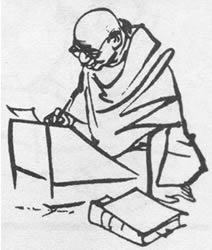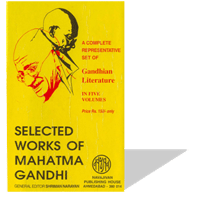
P.O. SEVAGRAM, DIST.WARDHA 442102, MS, INDIA. Phone: 91-7152-284753
FOUNDED BY MAHATMA GANDHI IN 1936
SECTION I : Selected Letters
[ from Selected Works of Mahatma Gandhi : Vol - 4 ]

SELECTED LETTERS
from
Selected Works of Mahatma Gandhi
Volume IV
Table of Contents
- Foreword
- Publisher's Note
SECTION I : LETTERS
- 1. To Dadabhai Naoroji
- 2. To G. K. Gokhale
- 3. To G. K. Gokhale
- 4. To Tolstoy
- 4A. From Count Leo Tolstoy
- 5. To Count Leo Tolstoy
- 6. To Leo Tolstoy
- 6A. From Count Leo Tolstoy
- 7. To Leo Tolstoy
- 7A. From Count Leo Tolstoy
- 8. To Maganlal Gandhi
- 9. To Maganlal Gandhi
- 10. To Narhar Shabhurao Bhave
- 11. To Mr Maffey, Private secretary To Viceroy
- 12. To W. B. Heycock
- 13. To Shankarlal on Ideas About Satyagraha
- 14. To Vinoba Bhave
- 15. To C F Andrews
- 16. To C F Andrews
- 17. To C F Andrews
- 18. To Kasturba Gandhi
- 19. To Kishorelal Mashruwala
- 20. To Sarojini Naidu
- 21. To Srinivas Sastri
- 22. To Srinivas Sastri
- 23. To Rabindranath Tagore
- 23A. From Rabindranath Tagore
- 24. To Rabindranath Tagore
- 25. From Rabindranath Tagore
- 25A. To Rabindranath Tagore
- 26. From Rabindranath Tagore
- 26A. To Rabindranath Tagore
- 27. To Rabindranath Tagore
- 28. To Rabindranath Tagore
- 29. To Rabindranath Tagore
- 30. To Rabindranath Tagore
- 31. To Rabindranath Tagore
- 32. From Rabindranath Tagore
- 32A. To Rabindranath Tagore
- 33. From G S Arundale
- 33A. To G S Arundale
- 34. To Every Englishman In India
- 35. To Viceroy
- 36. To Jawaharlal Nehru
- 37. To Jawaharlal Nehru
- 38. To Jawaharlal Nehru
- 39. To Jawaharlal Nehru
- 40. From Jawaharlal Nehru
- 41. To Jawaharlal Nehru
- 42. To Konda Venkatappayya
- 43. To T Prakasam
- 44. To Hakim Ajmal Khan
- 45. To Jamnalal Bajaj
- 46. To Mohomed Ali
- 47. To Motilal Nehru
- 48. To Motilal Nehru
- 49. To C Rajagopalachari
- 50. To C Rajagopalachari
- 51. To Kakasaheb Kalelkar
- 52. To A Friend
- 53. From Madeleine Slade or Miraben
- 53A. To Madeleine Slade
- 54. To Romain Rolland
- 55. To Romain Rolland
- 56. To Shri Shankaran
- 57. To Hermann Kallenbach
- 58. To Gulzarilal Nanda
- 59. To Dr Kailas Nath Kaju
- 60. To Dhan Gopal Mukherjee
- 61. To Henry S Salt
- 62. To The Viceroy
- 63. To Lord Irwin
- 64. To Reginald Reynolds
- 65. To Richard B Gregg
- 66. To Sir Samuel Hoare
- 67. To Ramsay MacDonald
- 68. To Pandit Malaviyaji
- 69. To The Secretary To The Government of Bombay, (Home Dept.), Poona
- 70. To Sir Tej Bahadur Sapru
- 71. To Carl Heath
- 72. To Carl Heath
- 73. To Carl Heath
- 74. To M A Jinnah
- 75. To M A Jinnah
- 76. To M A Jinnah
- 76A. From M A Jinnah
- 77. To M A Jinnah
- 78. From Subhash Chandra Bose
- 78A. To Subhash Chandra Bose
- 79. To Herr Hitler
- 80. To Every Briton
- 81. To Every Briton
- 82. To Generalissimo Chiang Kai-Shek
- 83. To Every Japanese
- 84. To American Friends
- 85. To Lord Linlithgow
- 86. To Lord Linlithgow
- 86A. From Lord Linlithgow
- 87. To Lord Linlithgow
- 87A. From Lord Linlithgow
- 88. To Lord Linlithgow
- 88A. From Lord Linlithgow
- 89. To Lord Linlithgow
- 90. To Agatha Harrison
- 91. To Winston Churchill
- 92. To Shriman Narayan
- 93. To Lord Pethick Lawrence
- 94. To Sardar Vallabhbhai Patel
- 95. To The Viceroy
- 96. To The Viceroy
- 96A. From Lord Mountbatten
- 97. To Abdul Ghaffar Khan
- 97A. From Abdul Ghaffar Khan
- 98. To A Friend
- 99. To Madame Edmond Privat
- 100. To The People of Gujarat
- Appendix I: Who Should Be Provincial Governors?
- Appendix II: A Psychological Explanation
- Appendix III: The Gandhian Constitutions for Free India
SECTION II : EXTRACTS FROM LETTERS
- Faith in God
- Religions and Scriptures
- Value of Prayer
- Truth and Non-violence
- The Science of Satyagraha
- Fasting in Satyagraha
- Unto This Last
- Khadi and Village Industry
- East and West
- Hindu-Muslim Unity
- Upliftment of Women
- The Good of All
- India's Freedom
- Education
- Caste System and Untouchability
- Brahmacharya
- Fearlessness
- Health and Hygene
- Self-restraint
- Self-development
- Selfless Service
- Voluntary Poverty
About This Volumes

Selected Works of Mahatma Gandhi comprises of Five volumes.
- Vol-I: Autobiography
- Vol-II: Satyagraha in South Africa
- Vol-III: Basic Works
- Ethical Religion
- Unto This Last
- Hind Swaraj or Indian Home Rule
- From Yeravada Mandir
- Discourses on the Gita
- Constructive Programme
- Key to Health
- Vol-IV: Selected Letters
- Vol-V: Voice of Truth
This book, Selected Letters, is volume-4.
Written by : M. K. Gandhi
General Editor : Shriman Narayan
Volume
Selected Works of Mahatma Gandhi : A set of five books
ISBN: 81-7229-278-3 (set)
Printed and Published by :
Jitendra T. Desai
Navajivan Mudranalaya,
Ahemadabad-380014
India
© Navajivan Trust, 1968
Download
Gandhi Letter 96 : To The Viceroy
New Delhi,
10/11th June 1947
DEAR FRIEND,
The Rajkumari has given me the purport of your conversation with her.
Though you have been good enough to tell me that J could see you at
any time I wanted to, I must not avail myself of the kindness. I would
like, however, to reduce to writing some of the things I hold to be
necessary for the proper and swift working of the scheme.
- As to the referendum in the Frontier Province I must confess that my idea does not commend itself to Pandit Nehru and his colleagues. As I told you, if my proposal did not commend itself to them, I would not have the heart to go any further with it.
- This, however, does not in any way affect my proposal that before proceeding with the referendum, you should invite Quaid-i-Azam Jinnah to proceed to the Frontier Province and to woo the Ministers including Badshah Khan and his Khudai Khidmatgars who have made the Province what it is—better or worse. Before he goes, no doubt, he should be assured of a courteous hearing from them.
- Whether he favours the idea or not Quaid-i-Azam should be asked to give a fair picture of the Pakistan scheme before the simple Pathan mind is asked to make its choice of Hindustan or Pakistan. I fancy that the Pathan knows his position in Hindustan. If he does not, the Congress or the Constituent Assembly now at work should be called upon to complete the picture. It will be unfair, I apprehend, to choose between Hindustan or Pakistan without knowing what each is. He should at least know where his entity will be fully protected.
- There is as yet no peace in the Frontier Province. Can there be a true referendum when strife has not completely abated ? Minds are too heated to think coherently. Neither the Congress nor the League can disown liability for disturbances by their followers. If peace does not reign in the land, the whole superstructure will come to pieces and you will, in spite of division, leave behind legacy of which you will not be proud.
- The sooner you have homogeneous ministry the better. In no case can the League nominees work independently of the whole Cabinet. It is a vicious thing that there is no joint responsibility for every act of individual members.
- The only way to keep the wonderful time table made by you is to anticipate the future and ask your special staff to work out all the items presented by you without reference to the Cabinet and then when the time comes, the report should be presented to the respective parties for acceptance, amendment or rejection.
- The more I see things the more firmly I believe that the States problem presents a variety of difficulties which demand very serious and fearless treatment on your part.
- The problem of the civil and military services, though in a way not equally difficult, demands the same firm handling as the States. Gurgaon strife is an instance in point. So far as I know one single officer is responsible for the continuance of the mischief.
- Lastly may I suggest that the attempt to please all parties is a fruitless and thankless task. In the course of our conversation I suggested that equal praise bestowed on both the parties was not meant. No praise would have been the right thing. "Duty will be merit when debt becomes a donation." It is not too late to mend. Your undoubted skill as a warrior was never more in demand than today. Fancy a sailor without his fleet, save his mother wit!
- I have tried to be as succinct as possible. I could not be briefer. If any of the points raised herein demand a personal talk, you have but to appoint the suitable time. Please do not think of calling me for the sake of courtesy.
- I received your kind note of 10th instant whilst I had almost finished this note. It does not call for a separate reply.
This was finished at 9.25 p.m. It will be typed tomorrow.
Yours sincerely,
M. K. GANDHI
To
H. E. THE VICEROY, SIMLA
Mahatma Gandhi-Correspondence with the Government - 1944-'47, pp. 256-58